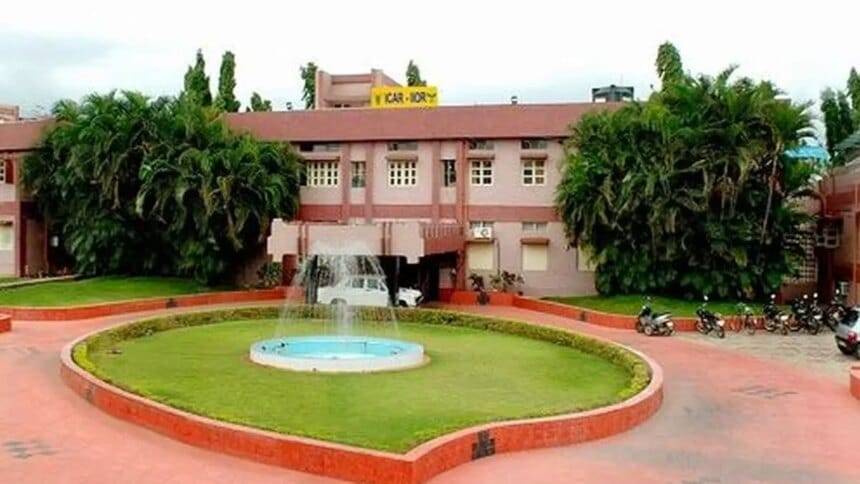Main Points In Hindi (मुख्य बातें – हिंदी में)
यहां भारतीय तिलहन अनुसंधान संस्थान (आईआईओआर) द्वारा विकसित बायोपॉलिमर तकनीक के प्रमुख बातें दी गई हैं:
-
नवीन बायोपॉलिमर तकनीक: आईआईओआर ने निजी कंपनियों के लिए एक पेटेंट बायोपॉलिमर तकनीक पेश की है, जो बीज संरक्षण में क्रांति लाने और फसल की पैदावार को 25-30 प्रतिशत तक बढ़ाने की क्षमता रखती है।
-
बीज कोटिंग की विशेषता: यह तकनीक बीजों को कोट करने के लिए एक विशेष बायोपॉलिमर का उपयोग करती है, जो लाभकारी रोगाणुओं, पोषक तत्वों और सुरक्षित रसायनों को सीधे पौधे तक पहुंचाती है। यह एक टाइम-रिलीज़ कैप्सूल की तरह काम करती है, जिससे पौधों को आवश्यक तत्व समय पर मिलते रहते हैं।
-
कृषि लागत में कमी: एक ही कोटिंग में कई इनपुट को मिलाने से, किसान अपनी आवश्यकताओं के अनुसार कृषि इनपुट की संख्या कम कर सकते हैं, जिससे उन्हें लागत में बचत होती है।
-
जलवायु परिवर्तन के प्रति लचीलापन: यह तकनीक पौधों को जलवायु परिवर्तन के adverse प्रभावों का सामना करने में मदद करती है, जिससे किसानों को पर्यावरणीय चुनौतियों का सामना करने में स्थायी समाधान मिलता है।
- व्यावसायीकरण के प्रयास: आईआईओआर ने इस तकनीक के प्रभावी प्रसार और व्यावसायीकरण के लिए दो निजी बीज कंपनियों के साथ एक समझौता ज्ञापन (एमओयू) पर हस्ताक्षर किए हैं, जिससे तकनीक को किसानों तक पहुंचाने का लक्ष्य है।
Main Points In English(मुख्य बातें – अंग्रेज़ी में)
Here are the main points from the article about the Indian Institute of Oilseed Research’s (IIOR) patented biopolymer technology:


-
Introduction of Biopolymer Technology: The Indian Institute of Oilseed Research (IIOR), a branch of the Indian Council of Agricultural Research, has introduced a patented biopolymer technology aimed at revolutionizing seed protection and significantly increasing crop yields.
-
Mechanism of Action: Developed by KSVP Chandrika and R.D. Prasad, this technology utilizes a special biopolymer for seed coating that delivers beneficial microbes, nutrients, and safe chemicals directly to the plant. The coating acts like a time-release capsule, gradually releasing active ingredients as the seeds germinate and grow.
-
Impact on Crop Yields and Resilience: The biopolymer technology is expected to enhance crop productivity by 25-30% by providing essential nutrients and protection against pests and diseases, while also increasing plants’ resilience to adverse effects of climate change.
-
Partnership and Commercialization: IIOR has signed a memorandum of understanding with two private seed companies for the effective transfer and commercialization of this biopolymer technology, with the goal of making it accessible to farmers across the country.
- Diverse Germplasm Collection: The institute has developed a diverse germplasm collection for various crops, including castor, sunflower, safflower, sesame, flaxseed, and Niger, to support the advancement of agricultural research and practices.
Complete News In Hindi(पूरी खबर – हिंदी में)
भारतीय कृषि अनुसंधान परिषद संस्थान की एक शाखा, भारतीय तिलहन अनुसंधान संस्थान (आईआईओआर) ने निजी कंपनियों के लिए एक पेटेंट बायोपॉलिमर तकनीक जारी की है। इस तकनीक में बीज संरक्षण में क्रांति लाने और फसल की पैदावार में उल्लेखनीय वृद्धि करने की क्षमता है।
केएसवीपी चंद्रिका और आरडी प्रसाद द्वारा विकसित यह नवीन तकनीक, बीजों को कोट करने के लिए एक विशेष बायोपॉलिमर का उपयोग करती है, जो लाभकारी रोगाणुओं, पोषक तत्वों और सुरक्षित रसायनों को सीधे पौधे तक पहुंचाती है।
यह बीज कोटिंग एक टाइम-रिलीज़ कैप्सूल की तरह काम करती है, जैसे-जैसे बीज अंकुरित होते हैं और बढ़ते हैं, धीरे-धीरे सक्रिय तत्व जारी करते हैं। यह सुनिश्चित करता है कि पौधे को सही समय पर आवश्यक पोषक तत्व और सुरक्षा मिले, जिससे उसकी विकास क्षमता और पर्यावरणीय तनावों के प्रति लचीलापन अधिकतम हो।
बायोपॉलिमर तकनीक से आवश्यक पोषक तत्व प्रदान करके और कीटों और बीमारियों से सुरक्षा प्रदान करके फसल की पैदावार को 25-30 प्रतिशत तक बढ़ाने की उम्मीद है। यह तकनीक पौधों की जलवायु परिवर्तन के प्रतिकूल प्रभावों को झेलने की क्षमता को भी बढ़ाती है, जिससे किसानों को बढ़ती पर्यावरणीय चुनौतियों का सामना करने के लिए एक स्थायी समाधान मिलता है।
आईआईओआर के एक प्रवक्ता ने कहा, “एक ही कोटिंग में कई इनपुट को मिलाकर, किसान संभावित रूप से आवश्यक अनुप्रयोगों की संख्या को कम कर सकते हैं, जिससे लागत बचत हो सकती है।”
आईआईओआर ने व्यापक प्रसार और व्यावसायीकरण के लिए पेटेंट बायोपॉलिमर तकनीक को प्रभावी ढंग से उद्योग में स्थानांतरित करने के लिए दो निजी बीज कंपनियों के साथ एक समझौता ज्ञापन (एमओयू) पर हस्ताक्षर किए हैं। इस साझेदारी का उद्देश्य देश भर के किसानों के लिए प्रौद्योगिकी को सुलभ बनाना है, जिससे कृषि क्षेत्र के विकास में योगदान मिलेगा।
संस्थान ने एक विविध जर्मप्लाज्म संग्रह बनाया, जिसमें अरंडी के लिए 3,289, सूरजमुखी के लिए 3,624, कुसुम के लिए 7,027, तिल के लिए 1,700, अलसी के लिए 2,885 और नाइजर के लिए 3,524 शामिल हैं।
Complete News In English(पूरी खबर – अंग्रेज़ी में)
The Indian Institute of Oilseeds Research (IIOR), a branch of the Indian Council of Agricultural Research, has launched a patented biopolymer technology aimed at private companies. This technology has the potential to revolutionize seed protection and significantly boost crop yields.
Developed by KSVP Chandrika and R.D. Prasad, this innovative technique uses a special biopolymer to coat seeds. This coating delivers beneficial microbes, nutrients, and safe chemicals directly to the plants.


The seed coating functions like a time-release capsule, gradually releasing active ingredients as the seeds germinate and grow. This ensures that plants receive the necessary nutrients and protection at the right time, maximizing their growth potential and resilience to environmental stresses.
The biopolymer technology is expected to enhance crop yields by 25-30% by providing essential nutrients and protection against pests and diseases. Additionally, it helps plants better withstand the adverse effects of climate change, offering farmers a sustainable solution to growing environmental challenges.
An IIOR spokesperson stated, “By combining multiple inputs in a single coating, farmers can potentially reduce the number of applications needed, resulting in cost savings.”
To promote widespread adoption and commercialization of this patented biopolymer technology, the IIOR has signed a memorandum of understanding (MOU) with two private seed companies. This partnership aims to make the technology accessible to farmers across the country, contributing to the growth of the agricultural sector.
The institute has also created a diverse germplasm collection, including 3,289 for castor, 3,624 for sunflower, 7,027 for safflower, 1,700 for sesame, 2,885 for flax, and 3,524 for Niger seeds.
Published on November 29, 2024.
Source link








